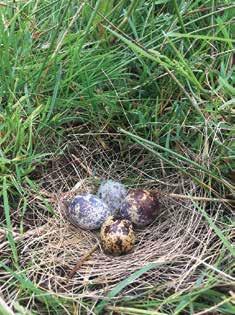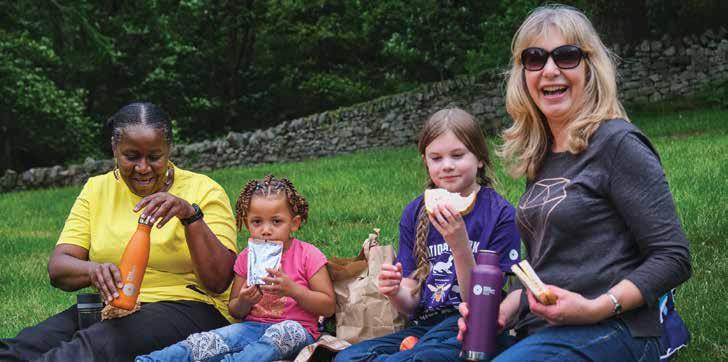
6 minute read
Know before you go – how to keep your visit safe and enjoyable
Know before you go...
Picnic perfect – a great way to enjoy the Peak District when coronavirus measures allow this summer.
Photograph taken prior to Covid-19 restrictions.
...how to be #PeakDistrictProud
If the Peak District National Park is your destination this spring and summer, here are a few simple tips to make sure your day is stress-free, safe and enjoyable!
Before you leave home
• Decide on your destination within the
Peak District – and particularly where you will park the car. Many places can get very busy and some parking allocations fill up by mid-morning or even earlier. Having a location in mind and setting off early can avoid queues, waiting to park or driving around to find alternative spots. • Grab a bag for your rubbish – one of the biggest ways you can help is to take home what you bring. Bins are costly to empty and maintain, and remote areas may not FACT: It costs nearly £40,000 a year to collect litter and rubbish from National Park Authority sites alone. have them at all. • Leave the BBQ at home – open fires are not permitted anywhere in the open countryside in the Peak District, and fines may apply in some areas – don’t risk it! • Check before you pitch – ‘wild camping’ requires the permission of the landowner.
Don’t assume your chosen location is suitable unless you’ve already secured permission. There are no wild camping options on National Park Authority land.
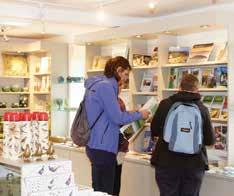
✓Safety check
• Do I have the right gear? • Do I know what the weather will be like? • Am I confident I have the knowledge and skills for the day?
www.adventuresmart.co.uk
When you’ve arrived
• Say hello at a Visitor Centre – our teams are on hand to help your day go smoothly, from maps and guides on the best routes, to refreshments or picking up those lastminute items you’ve forgotten! • Take the lead – keeping dogs under close control on a lead from 1st March to 31st July (and all year round near livestock) helps keep you and your pet safe, and protects farm animals and wildlife. • Get in the zone – parking your car in a designated bay (not on verges or across entrance gates) ensures emergency and farm vehicles can get through on narrow roads and traffic can flow smoothly.
Don’t be selfish with your selfie!
Young livestock can be easily frightened and mothers very protective, so give animals plenty of respect and space.
✓Protect yourself and the countryside
• Follow any signs. • Leave gates and property as you find them. • Protect plants and animals, and take your litter home. • Keep dogs under close control. • Consider other people.
www.peakdistrictproud.co.uk
Before you head home...
Take home a taste of the Peak District or a special memory by supporting our many local businesses, with hundreds of products made right on our doorstep.
However you’ve been #PeakDistrictProud during your visit, be sure to let us know on social media!
#peakdistrict
Locally-made products can be found at our visitor centres. Why not treat yourself!
✓Be Covid safe
• Follow government guidelines. • Protect local communities. Keep your distance. Sanitise your hands frequently. • Opening times and availability of some facilities and attractions may vary as
Covid-19 restrictions change. If it looks busy it is too busy, be prepared to change your plans and find somewhere less crowded.
www.peakdistrict.gov.uk/covid19
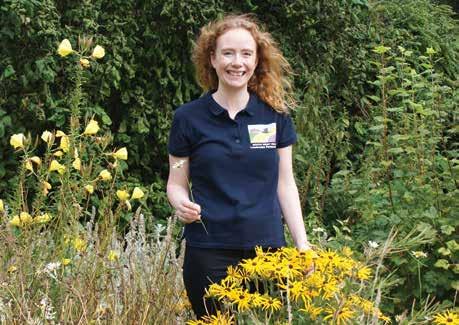
Get involved with Buxton Wild Weeks. Pictured is Jackie Wragg.
Going wild for wildlife in Buxton
This year, South West Peak Landscape Partnership (SWPLP), Buxton Civic Association, Transition Buxton and the Buxton Advertiser have joined forces to launch Buxton Wild Weeks focusing on supporting wildlife.
There will be two Buxton Wild Weeks: from Monday 24th May and from Monday 5th July. Local schoolchildren will take part in environmental activities and members of the community will be encouraged to connect with, enjoy and support their local wildlife.
Support from the Bingham Trust has purchased biodiversity kits for schools and the community to borrow to help them discover the wildlife in their school grounds and local area.
Jackie Wragg, SWPLP youth engagement officer, says: “Despite the uncertainties of the pandemic, one thing that continues to be certain is the huge benefits we can all experience individually from being closer to nature and wildlife.
“By thinking about wildlife and sustainability in school and at home, as well as in the wider community, during Buxton Wild Weeks means we can all help make a difference.”
SWPLP is funded by the National Lottery Heritage Fund.
For more information about Buxton Wild Weeks, email Jackie Wragg on
jackie.wragg@peakdistrict.gov.uk
Moorland restorers win national award
Despite the challenges of a global pandemic and a harsh winter, Moors for the Future Partnership (MFFP) managed to adapt and innovate to continue their important conservation work restoring 6.74 km² of peatland to boost biodiversity, benefit local wildlife, improve water quality, reduce flood and fire risk and increase carbon capture to tackle climate change. Their efforts have been recognised with a Campaign for National Parks Park Protector Award.
David Chapman, MFFP chair, said: “I am very proud of the way that the Partnership has continued to keep things going at pace, successfully carrying out over £5million of restoration works on the Peak District and South Pennine moorlands despite a snowy carpet blanketing the moors this winter, and coordinating the programme of works Moors for the Future Partnership beat the snow to continue their work and win national recognition.
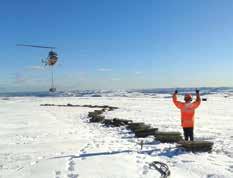
from their kitchen tables. The Park Protector Award is well-deserved for their innovation and agility in keeping the show on the road during a global pandemic.”
Fake eggs helping to save wading birds
It sounds like the start of an April Fool’s prank or fake news, but fake eggs in artificial nests really are being used to find out which predators are making life hard for wading birds.
Wading bird populations, such as lapwing, curlew and snipe, are in decline across Europe but Peak District moors and farmland provide important habitat for them to breed. Scientists are looking to find the optimum habitat that will give these ground-nesting birds their best chance to raise their young successfully.
Leah Kelly, a PhD student at the University of Sheffield, is studying whether there is a relationship between habitat management (cutting of rushes) and the incidents of predation on wader nests. The results could inform future agrienvironment schemes.
Leah says: “Using artificial nests means that the experiment can be scientifically designed and measured. They mimic real wader nests but the egg is made of plasticine so it can be examined for tooth or beak markings and show what kind of predator finds the nest.”
Her work is co-supervised by the RSPB and funded by the National Lottery Heritage Fund, as part of the South West Peak Landscape Partnership.
You can read more online about the artificial nest experiment in the South West Peak and Geltsdale, Cumbria, in the Zoological Society of London’s journal: Animal Conservation, at: https://
zslpublications.onlinelibrary.wiley.com/
doi/10.1111/acv.12672.
Further information and technical guidance notes for land managers and farm advisors will be published in the future.
